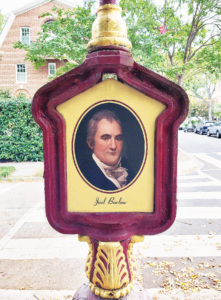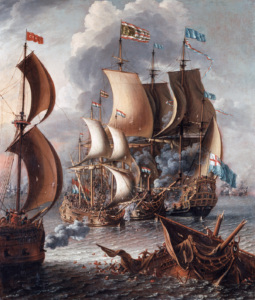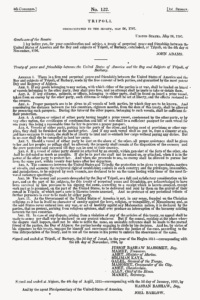Editor’s Note: After the article “You’ve got questions; we’ve got answers” ran in the September issue of Church & State, several Americans United members emailed to ask why we did not include the Treaty of Tripoli in the response to the question about claims that the United States was founded to be a Christian nation. The short answer is space limitations, but those messages made it clear that AU members are interested in the treaty and that we should say more about it.
The last time we wrote about the Treaty of Tripoli was in 1997, its 200th anniversary. For our newer members, this article, which is based in part on the 1997 piece, gives an overview of the treaty and explains the challenge it presents to Christian Nationalists. This article incorporates research conducted by Ed Buckner, a longtime AU member and author (along with his son Michael) of In Freedom We Trust: An Atheist Guide to Religious Liberty.
Joel Barlow longed to be a famous poet. He spent three decades working on an epic he called “The Columbiad.” Published in 1807, it was Barlow’s paean to America. Don’t feel bad if you’ve never heard of it. Very few people have. “The Columbiad” has been called “turgid” and “unreadable,” among other things.
The simple truth is, Barlow was a mediocre poet — but a great diplomat. And in that role, he was instrumental in bringing about one of the most intriguing, if overlooked, episodes in early U.S. history — a declaration by the American government that our country was in no way founded to be an officially Christian nation.
The statement appears in the Treaty with Tripoli, a document designed to smooth relations between the fledgling United States and what was then known as the state of Tripoli, an officially Muslim region of North Africa. Unanimously passed by the Senate on June 10, 1797, the treaty had been negotiated by Barlow during the presidency of George Washington but was signed into law during the administration of John Adams.

Not forgotten: Joel Barlow gets recognition in his old D.C. neighborhood (Church & State photo/Rob Boston)
The treaty is of interest to students of church-state separation because of Article 11. It states, “As the government of the United States of America is not founded in any sense on the Christian religion — as it has in itself no character of enmity against the laws, religion or tranquility of Musselmen [Muslims] — and as the said states have never entered into any war or act of hostility against any Mahometan nation, it is declared by the parties, that no pretext arising from religious opinions shall ever produce an interruption of the harmony existing between the two countries.”
How did that language get in the treaty, and why is it significant? To answer those questions, we did need to back up a bit and put some things in context.
In this post-Revolutionary War era, the U.S. emerged onto the world stage in a tentative position. Its navy was small, and the new nation, while eager to establish global trade, found itself the subject of a kind of international bullying.
Tripoli, Algiers and Tunis in north Africa were known as the Barbary States. These essentially outlaw nations made their way in the world through a form of high seas piracy. The established powers of Europe paid the Barbary States tribute to leave their ships alone, but the cash-strapped United States sought a different approach: diplomacy.

(Lorenzo A. Castro “A Sea Fight with Barbary Corsairs.” Public Domain)
Unfortunately, for a variety of reasons, that gambit didn’t work. Algiers declared war on the United States in 1785 and began attacking American ships. Captured crew members were transported to north Africa and kept under harsh conditions. The Barbary pirates seemed to assume that all Americans were Christians and often paraded their captives through the streets, where they were jeered for being “infidels.”
In 1793, Barbary pirates captured a U.S. cargo ship called “Polly” and took its 12-man crew captive. The men were informed to expect harsh treatment “for your history and superstition in believing in a man who was crucified by the Jews and disregarding the true doctrine of God’s last and greatest prophet Mohammed.”
In an effort to clean up this mess, Washington in 1795 tapped Barlow, a native of Connecticut, to act as an envoy to the Barbary States. Barlow was authorized to pay Algiers, the leading Barbary faction, $800,000 in tribute with the promise of more money to come.
Barlow successfully negotiated the release of hundreds of Americans who had been held captive, and while traveling in Algiers he met Richard O’Brien, a sailor who was among those captured by the Barbary pirates. Barlow sent O’Brien to Europe to arrange some loans to pay for the tribute. In an ironic stroke, O’Brien’s ship was captured by pirates from Tripoli while en route. Finding himself with some “down” time, O’Brien wrote a draft of the Treaty with Tripoli and forwarded it to Barlow in Algiers.
It’s not known which man actually wrote Article 11 or why the language was inserted, but we do know that Barlow was successful in getting Jussof Bashaw Mahomet, the bey of Tripoli, to accept the treaty. Negotiations were concluded on Nov. 4, 1796.

In print: The Treaty of Tripoli as presented to the U.S. Senate in 1797 (Public domain)
Barlow forwarded the treaty to Washington, D.C., where Article 11 raised no eyebrows. On May 26, 1797, Adams submitted the treaty to the Senate with a short note that read, “I lay before you, for your consideration and advice, a treaty of perpetual peace and friendship between the United States of America and the Bey and subjects of Tripoli, of Barbary, concluded, at Tripoli, on the 4th day of November, 1796.”
Did Barlow insert the language? The only evidence is circumstantial, but it’s at least somewhat compelling. Primarily, Barlow was an advocate of church-state separation who embraced the theological Deism of founders like Washington and Thomas Jefferson. In a 1791 book on politics Barlow attacked established churches, and James Woodress, a leading Barlow biographer, noted that Barlow in the book argued that “the wedding of church and state is a great evil and points to the blessings enjoyed by the United States without a state church.” (Barlow was also friends with Thomas Paine and helped him publish the first part of The Age of Reason.)
It’s also possible that officials in Tripoli wanted this clarifying language in the treaty. The Barbary States were used to dealing with the great powers of Europe, which were officially Christian. They may have assumed that the United States, as a kind of spinoff from England, was an officially Christian state as well.
While speculation about the origins of the language is interesting, what’s more relevant is how the treaty was received in America. Article 11 simply didn’t spark a backlash.
In his 1984 book Jews, Turks and Infidels, scholar Morton Borden says of Article 11, “What is significant about the Tripoli treaty is … its ready acceptance by the government. Not a word of protest was raised against Article 11 in 1797. Secretary of State Timothy Pickering endorsed and John Adams transmitted the treaty to the Senate with a customary message. Federalists and Republicans in the Senate approved it without objection. Whatever their personal feelings on the question of religious equality for non-Christians in particular states, all concurred that Article 11 comported with the principles of the Constitution.”
The 12-article treaty received standard treatment. It was read aloud on the floor of the Senate, and copies were printed for the senators. No one raised an objection, and the vote in its favor was unanimous.
In her book Moral Minority: Our Skeptical Founding Fathers, historian Brooke Allen notes that the vote on the treaty was only the third unanimous vote in the Senate’s history.
Within a few days of its passage, copies of the treaty began appearing in newspapers. The June 17, 1797, edition of The Philadelphia Gazette & Universal Daily Advertiser, for example, printed the entire thing, including Article 11. It was reprinted in two New York newspapers as well. Allen writes, “[T]here were no screams of outrage, as one might expect today.”
Borden notes that in the years after its ratification, the treaty began to achieve some notoriety.
“Article 11 had been cited hundreds of times in numerous court cases and political debates whenever the issue of church-state relations arose,” he wrote. “Jews frequently referred to the article in discussions of a much-debated question, whether or not the United States was a Christian nation.”
(Sadly, the treaty failed to create a lasting peace between America and the Barbary States. By the early 1800s, the Barbary States were again attacking U.S. shipping. President Thomas Jefferson decided on a military response. In 1804, American ships bombarded Tripoli — a conflict later immortalized in the reference to “the shores of Tripoli” in the Marines’ Hymn. The following year, a new peace treaty was drafted. This one did not contain the exact wording of Article 11, but it did note that religious differences should never be an excuse for war. The new treaty was much longer, and the “Christian nation” language might have been omitted simply for space or because at that point, the Barbary States had been dealing with the United States for nearly 20 years and knew the country was not officially Christian.)
The 1797 version of the treaty was occasionally pressed into service in later encounters with the Muslim world. In 1899, American diplomat Oscar S. Straus used Article 11 to convince the sultan of the Ottoman Empire that the United States was not hostile to Islam. The U.S. had just taken control of the Philippines, and Straus was trying to find a way to persuade Sunni Muslims there to accept American rule. In his memoirs, Straus reported that when the sultan read article 11, “his face lighted up,” and he agreed to help.
These days, Article 11 remains of interest to church-state separation activists. In his 2019 book The Founding Myth: Why Christian Nationalism In Un-American, Andrew L. Seidel, AU’s vice president of strategic communications, points to the treaty as just one among many historic documents that make it clear that the United States was not founded to be an officially Christian nation. But as Seidel and others have noted, it is the U.S. Constitution, our nation’s secular governance document, that is most relevant in this debate.
Occasionally, one sees a meme on social media with the famous language from Article 11 incorrectly attributed directly to either George Washington or John Adams. But while the treaty has long had fans in freethought/atheist communities, it’s a safe bet that if you asked most Americans about it, you’d draw a blank stare.
That’s the story of the Treaty with Tripoli. What of Joel Barlow, the man behind it? His story has a sad ending. In 1811, President James Madison named Barlow an envoy to France. A year later, while in Lithuania, Barlow became caught up in a stream of refugees fleeing the Napoleonic Wars.
In late December of 1812, Barlow and other refugees had reached Zarnowiec, a village in Poland. Barlow, seriously ill with pneumonia, died there on Dec. 26 and was buried in the courtyard of a local church. He was 58.
Occasionally there was talk of bringing Barlow’s body back to America, but it never happened. His gravesite is marked with a marble tablet that, according to some accounts, his wife Ruth arranged to have erected. It contains a Latin inscription that reads, “Joel Barlow, diplomatic minister from the United States of America to the Emperor of the French and the Queen of Italy, died here while traveling.”
But Barlow has not been entirely forgotten on these shores. There is a small town in Ohio named after him, and Redding, Conn., is home to Joel Barlow High School.
Washington, D.C., also contains an unusual tribute to Barlow. His mansion in the city, known as Kalorama, bequeathed its name to the surrounding neighborhood. On a street called Bancroft Place is an image of Barlow affixed to what used to be a police call box. The marker refers to Barlow as “a businessman, diplomat and published poet.”
Barlow would undoubtedly be pleased.


